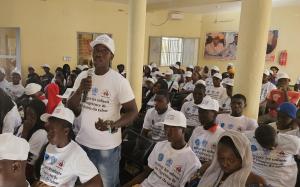Mali: School committees to protect youth from smoking
Bamako – It has been almost a year since 17-year-old Aziz*, a final-year high school student, quit smoking. He had fallen into smoking at the age of 14 due to peer pressure and curiosity. “I started smoking a little just to fit in. At first, it was just to try it, but then I couldn’t stop. I was smoking almost every day,” the teenager admits. “When I smoked, I felt more grown-up, cooler, but I didn’t realize the risks it posed to my health.”
Each year, over 146 000 deaths attributable to smoking are recorded in the African Region. Today, the region has more than 61 million tobacco users. The increasing prevalence of tobacco use among adolescents aged 13 to 15 is a major concern. Over 6% of individuals in this age group already use tobacco products, largely drawn in by deceptive concepts and messages.
Mali is no exception to this rising trend in youth tobacco use. To address it, the country, with support from World Health Organization (WHO), has taken various measures to protect young people from smoking, including the establishment of anti-smoking school committees starting in 2015.
To date, the country has 32 anti-smoking committees whose role is to raise awareness among peers about the dangers of tobacco use in schools, popular neighborhoods, and public places. These committees also offer support through counseling and referrals to healthcare professionals.
For the past two years, Moussa, a student, has been a member of his institute’s anti-smoking committee. During this time, he has helped five young people quit smoking. “What motivates me is seeing my peers change and feel better in their bodies. Tobacco destroys health, and I find it important to protect our generation from its effects. It’s a commitment I take very seriously,” says the future nurse. “We first try to understand the reasons that drive a person to smoke. Then we explain the real health dangers and, above all, the benefits of quitting. We don’t judge—we listen and encourage.”
This approach allows anti-smoking committees to reach more young people and contributes to reducing tobacco use among them. “We know we’ve made progress, but we need to conduct studies to provide evidence of the actions taken against smoking, to better adjust future actions,” said Dr Abdoulaye Koné, national focal point for tobacco control in Mali. “If current trends continue, the goal of a 30% reduction between 2010 and 2025 will likely be achieved.”
From 11.3% in 2010, the smoking rate among people aged 15 and older in Mali dropped by four points to 7.3% in 2023.
Dr Koné explained that “anti-smoking school committees are a means of preventing youth smoking through ongoing communication activities within schools.”
In addition to the anti-smoking committees, the country increased taxes on imported tobacco products from 25% in 2018 to 40% in 2023. Along with banning smoking in public places and workplaces, Mali prohibits the importation, distribution, sale, and use of new tobacco and related products such as hookah and e-cigarettes. The same applies to tobacco industry advertising and event sponsorship.
Furthermore, the Ministry of Health provides support to those who want to quit smoking. The country offers nicotine replacement therapies as well as smoking cessation services.
Thanks to these various initiatives, Mali has won the WHO Tobacco-Free Award seven times between 2000 and 2022 (2000, 2004, 2010, 2012, 2015, 2020, and 2022). The organization supports the anti-smoking network by providing awareness materials. WHO also backs advocacy efforts and helps train members of the anti-smoking committees and health professionals.
“WHO supports all these initiatives from the Ministry of Health to protect youth from the scourge of tobacco use. Our role includes helping anti-smoking committees raise awareness to better inform young people about the dangers of tobacco and ensure better health for the population,” said Dr. Patrick Kaboré, WHO Representative in Mali. “Prevention is our best weapon for a healthier future.”
To engage young people, inter-school and inter-neighborhood sports competitions are often organized, during which messages about the dangers of smoking are delivered.
“One day, during a sports event at school, our peers organized an awareness session on the harms of tobacco. I truly understood the health risks and approached them. They listened without judgment and gave me advice on quitting. They also motivated and supported me through the tough times,” shares Aziz. For the past 11 months, Aziz hasn’t touched tobacco or any related products. “I feel much better and I'm proud of myself for quitting smoking.”
Aziz is now a leading voice in the fight against smoking. “Tobacco brings nothing good. It’s better to stop now, you’ll see that you’ll feel freer and healthier.”
Communications Officer
Regional Office for Africa
Email: lawsonagbluluf [at] who.int (lawsonagbluluf[at]who[dot]int)
Chargé de communication
email: cissea [at] who.int (cissea[at]who[dot]int)

